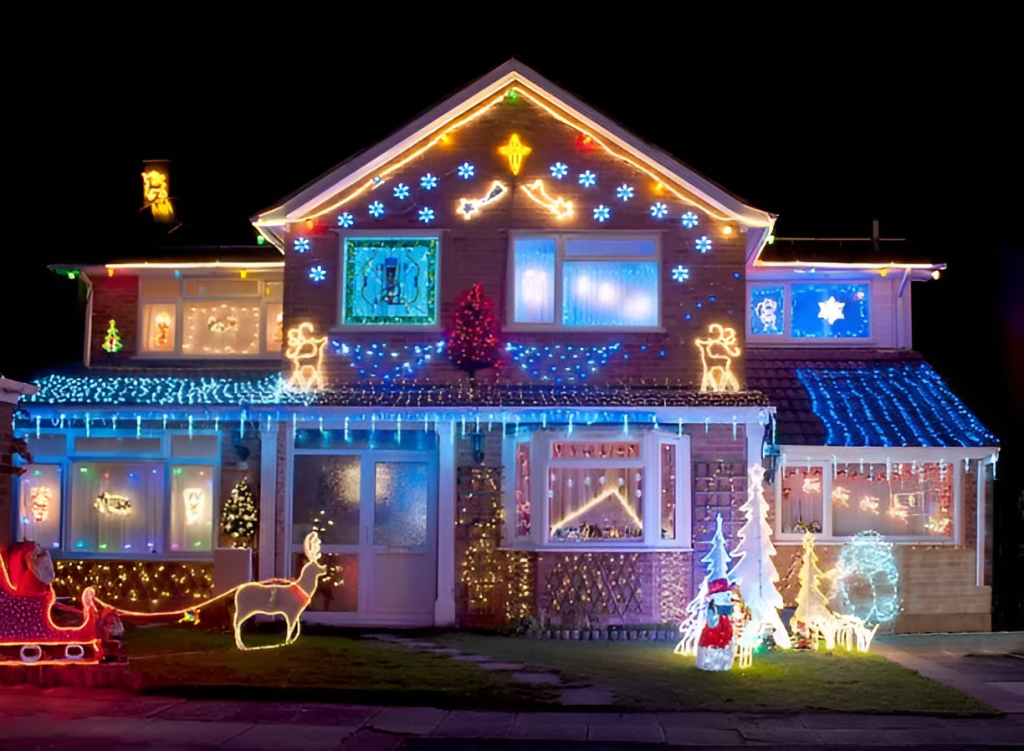
Key Highlights
- Electrical overloads: Holiday lights and appliances should not be overloaded and should be distributed over multiple outlets and circuits. Heating from overloads can cause overheating, damaged cords, and electrical fires.
- Cord inspection: Inspect all electrical cords (appliance cords, power cords, extension cords) for damage like exposed wires or fraying. Damaged cords pose an electric shock hazard and fire hazard.
- Extension cord use: For outdoor use, use the appropriate extension cords. Never run an indoor extension cord outside. Make sure they’re rated for the intended use.
- Regular maintenance: Apply appliance maintenance like checking cords, plugs, and vents (including dryer vents for lint) on a habitual basis.
- Circuit breakers/fuses: Know your home’s electrical system and how to find your circuit breaker panel or fuse box. Do not continually reset tripped breakers or change blown fuses without investigating the cause.
- Natural gas safety: Don’t forget the risk from gas leaks and carbon monoxide poisoning from gas appliances, including water heaters and dryers. Make sure they’re properly vented and have working carbon monoxide detectors.
- S.T.A.R. Appliance Repair: S.T.A.R. Appliance Repair provides appliance repair, maintenance, and addresses electrical safety concerns, working directly with customers for these needs.
_________________________________
It’s a festive time when the holiday decorations go up, the food comes out warm, and the gatherings are even warmer. Our homes become magical with twinkling lights, but it’s important to remember that the combination of holiday decorations and daily use of electrical appliances can mean trouble if we’re not careful. During this holiday season, S.T.A.R. Appliance Repair wants to help keep your home and family safe from electrical overload by helping you understand what it is.
Overloading circuits is one of the biggest electrical hazards of the holidays. It results from too much electricity being pulled through a single circuit—usually, if too many lights or electrical appliances are plugged into one outlet or when you use too many extension cords. These electrical overloads can lead to overheating, which may damage electrical cords, cause electrical fires, and melt the insulation around cables.
From Small Appliances to Large Ones, What Are the Risks?
Think about all the electrical appliances you use daily: TVs, dishwashers, washing machines, dryers, toasters, hair dryers, curling irons, cell phone chargers, blenders, coffee makers, and many other small electrical appliances. Then, throw in holiday lights. These all draw some power. Pouring too much water through a limited pipe is like overloading a circuit – eventually, something gives.
It’s not just electrical appliances we need to worry about. Gas examples include water heaters and some dryers. Some of these appliances run on natural gas but often need electricity to ignite or control. In certain situations, an electrical overload can affect these systems, leading to potential malfunctions or safety risks. Carbon monoxide poisoning is always a possibility, and proper venting is critical to keep the leak under control and minimize the possibility of a fire.
Regular maintenance, including checking for lint buildup inside the vent of a gas dryer, is important. Carbon monoxide is a colorless, odorless gas produced during the incomplete combustion of natural gas and many other fuels. The main cones are vital in preventing carbon monoxide from being a silent killer, and working carbon monoxide detectors are essential.
Practical Tips for Avoiding Electrical Overloads
Spread the Load
Spread your lights and electrical goodies out across your various circuits. Do not plug several high-wattage appliances into the same outlet, or use a single extension cord to power several devices at the same time.
Inspect Electrical Cords
It is important to inspect any electrical cords, including appliance cords and power cords for power tools, before using them. Be sure to look for fraying or exposed wires. Damaged electrical cords are a very serious electrical hazard and can contribute to electrical overload, increasing the risk of electric shock.
Use the Appropriate Extension Cords
Always use extension cords designed specifically for outdoor use when you need an extra cord outdoors. Never take extension cords inside your home and use them outside, as this can increase the risk of electrical overload. Make sure any extension cord you’re plugging devices into is rated for the amperage of those devices.
Independent Testing and Safety Standards
Check whether lights, electrical appliances, or extension cords have Underwriters Laboratories (UL) or other independent testing laboratory labels. These labels mean that the products being sold are safe and meet established standards. It’s important to do this independent testing to minimize fire risk and other possible hazards.
GFCI Protection
In areas such as the kitchen, outdoors, or near water, utilize GFCI outlets and, where possible, GFCI extension cords. The simplest way for a GFCI to monitor the current flowing in a circuit is to do so constantly. It shuts off the power right away if it detects a difference between the outgoing and incoming current, which can indicate a potential ground fault that could cause an electric shock or an electrical overload. This is especially important for use with small appliances close to water.
Regular Maintenance
Checking appliance cords and plugs can prevent electrical hazards, and regular maintenance of your electrical appliances can as well. This includes checking the lint filter on your dryer and making sure the vent is clean. It’s also true for your gas appliances like your hot water heater.
Circuit Breakers and Fuses
Know your home’s electrical system. Where is your circuit breaker panel or fuse box? If a circuit breaker trips or a fuse blows, it’s an overload. Don’t ignore the problem and simply reset the breaker or replace the fuse.
Daisy Chaining
“Daisy chaining”—plugging one power strip into another or extending extension cords—is dangerous and a fire hazard. It creates an electrical bottleneck, forcing more current than the wires can handle. This can cause overheating and even potential fires. Contact a qualified electrician if you consistently need more outlets.
Other Considerations and Hot Water
Even simple things like a water heater can cause undue electrical strain, especially if it’s electric. Remember, it’s not just the holiday lights; it’s the whole electrical load on your system.
Natural Gas and Carbon Monoxide: Separate But Important
This article is about electrical safety, but as an electrical appliance repair business, it’s important to mention natural gas safety. While gas appliances are not about electrical fires from overloads, they can lead to other safety hazards. Improper venting and gas leaks can cause carbon monoxide poisoning. Ensure your home has functioning carbon monoxide detectors and that gas appliances are professionally inspected regularly. If you smell gas, leave immediately and contact your gas company.
S.T.A.R. Appliance Repair: Here to Help
At S.T.A.R. Appliance Repair, we’re committed to helping you keep your home family safe year-round. We specialize in repairing and maintaining all types of appliances, from small appliances like toasters and hair dryers to large appliances like washing machines, dryers, and dishwashers. We also want to stress the importance of electrical safety and avoiding electrical hazards like electric shock. If you have any concerns about your appliances or electrical system, don’t hesitate to call us. We can help you identify potential dangers and ensure your appliances are operating safely.
If you experience any issues with your appliances or have concerns about electrical safety in your home, contact S.T.A.R. Appliance Repair today for expert assistance. We’re here to help you keep your home safe and running smoothly.
Frequently Asked Questions
How can I prevent electrical overload in my home?
To prevent electrical overload, spread out your electrical devices and holiday lights across multiple outlets and circuits. Avoid plugging multiple high-wattage appliances into the same outlet and never daisy chain power strips or extension cords.
What are the dangers of electrical overload?
Electrical overload can cause overheating of cords and outlets, melting insulation around wires, and leading to electrical fires or shocks. It can also damage your appliances and home wiring.
Can damaged electrical cords cause an electrical overload?
Yes. Damaged or frayed cords can increase the risk of electrical overload because they may not safely carry the required current, which can lead to short circuits, shocks, or fires.
Are all extension cords safe to use outdoors?
No. Only use extension cords rated for outdoor use when plugging in devices outside. Using indoor extension cords outdoors can contribute to electrical overload and pose safety hazards.
How do circuit breakers relate to electrical overload?
Circuit breakers are designed to protect your home from electrical overload. They trip (turn off) when they detect too much current flowing through a circuit. If breakers trip repeatedly, it’s a sign of an electrical overload that should be investigated.
What is “daisy chaining,” and why is it dangerous in terms of electrical overload?
Daisy chaining refers to plugging one power strip or extension cord into another. This can create a bottleneck where too much current flows through a limited wiring system, causing overheating and increasing the risk of electrical overload and fires.
How often should I inspect cords and appliances to avoid electrical overload?
Regular inspection is key. Check all appliance cords, power cords, and extension cords for signs of wear, fraying, or damage before use, especially during the holidays when electrical use tends to increase.
